Key Takeaways
- Building a website for your small business is essential for enhancing visibility, building trust, and driving sales. A well-designed website can significantly help your business grow by improving search engine rankings and offering 24/7 accessibility to potential customers.
- The cost of building a small business website varies widely depending on factors such as domain name, hosting, SSL certificates, and website design. Domain costs range from $0.99 to $60 per year, while hosting can cost between $10 to $500 annually. SSL certificates can cost from $0 to $249 annually, depending on security needs.
- Website design costs can range from $1,000 to $20,000 or more, depending on the complexity and features required. Custom features, such as e-commerce capabilities and unique graphics, can increase the design cost significantly.
- Consider ongoing website maintenance, which can range from $50 to $200 per month, to ensure your site runs smoothly and securely.
- Deciding between hiring a professional or using a DIY website builder depends on your budget and business goals. Professionals offer customized designs but at a higher average cost, while DIY options are more budget-friendly but may lack advanced customization.
- Cost-saving strategies include using website builders, prioritizing essential features, and adopting a phased development approach to spread out costs over time.
- Always set a clear budget, focusing on essential features that align with your business goals, to manage the cost of building a small business website effectively.
Why Your Small Business Needs a Website
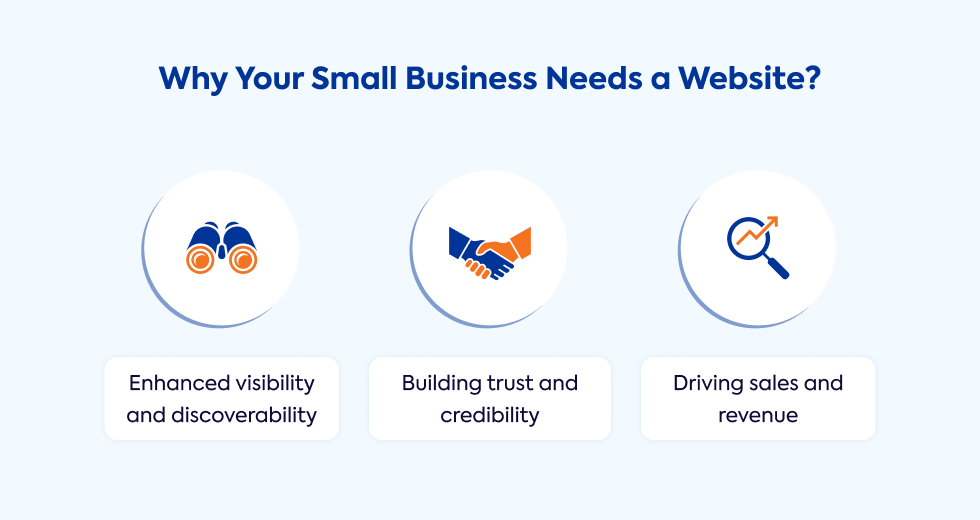
Enhancing Visibility and Discoverability
Today, having a website for your small business is more important than ever. When you consider that 70% of people research companies online before making a purchase decision, it’s clear that your online presence can significantly impact your business's visibility.
A website for your small business is not just a digital business card; it’s a powerful tool that can help you reach potential customers far beyond your local area.
One of the primary advantages of a small business website is the boost it provides to search engine visibility.
With a well-designed website, you can improve your rankings on search engines, making it easier for customers to find you when they’re searching for products or services you offer.
By implementing effective SEO strategies, including keyword optimization and content marketing, you increase the likelihood that your business will appear in relevant search results.
Moreover, a website allows you to showcase your products and services 24/7. Unlike a physical store with limited hours, your website is always accessible, providing potential customers with the information they need at any time.
This constant availability can lead to increased customer interaction and ultimately, business growth.
Building Trust and Credibility
Trust and credibility are crucial factors in attracting and retaining customers. Many small businesses often find that having a professional website can greatly enhance their credibility.
With 70% of buyers checking online before making a purchase, the absence of a website can make your business appear less trustworthy.
One of the key features that contribute to building trust online is the use of SSL certificates. An SSL certificate secures data transmission between the user’s browser and your website, signaling to customers that your site is safe.
This is especially important for small businesses that handle sensitive information, like payment details.
Additionally, professional web design plays a vital role in how your business is perceived. A custom website with a consistent brand identity, including custom logos and thoughtful design elements, can make your business appear more reliable and trustworthy.
Moreover, displaying customer reviews and testimonials on your website serves as social proof, further enhancing your business's credibility.
When visitors see that your website is secured by an HTTPS protocol, it reassures them that their information is protected, which can lead to increased trust and more business.
Driving Sales and Revenue
Your small business website is not just about looking good—it’s also a critical tool for driving sales and revenue.
E-commerce capabilities on your website mean that you can make sales 24/7, regardless of your physical store’s hours.
This flexibility allows you to cater to customers whenever it’s convenient for them, which can significantly boost your sales.
Online shopping continues to grow rapidly, with e-commerce sales in the U.S. exceeding $850 billion annually. By having a well-designed website with e-commerce functionality, you’re positioning your business to tap into this lucrative market.
Additionally, your website can support various online marketing strategies, such as email campaigns and discount offers, which can drive conversions and increase your revenue.
Custom features like payment gateways and online booking systems can streamline the purchasing process for your customers, making it easier for them to do business with you.
Furthermore, ongoing SEO efforts can help attract more traffic to your site, giving you more opportunities to convert visitors into customers and grow your revenue.
Understanding the Costs of Building a Small Business Website
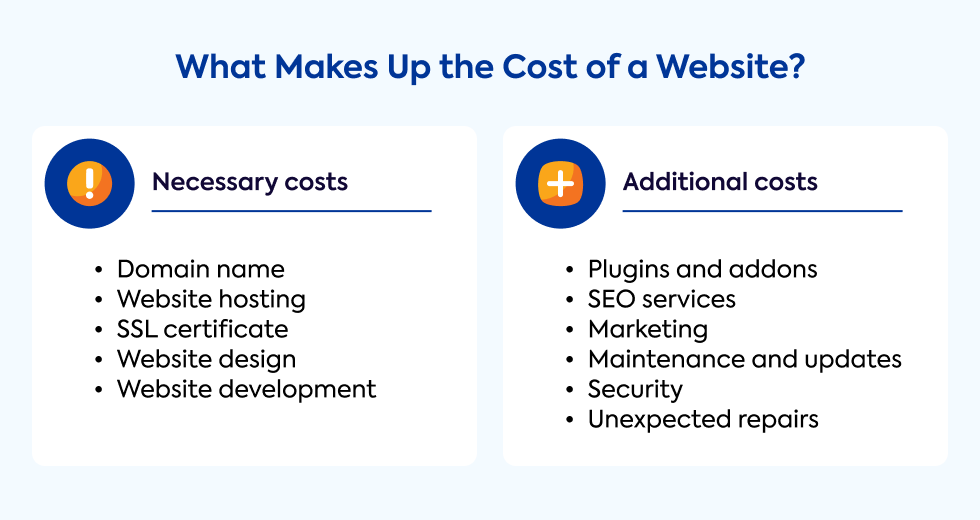
Domain Name Costs
When you're setting up a website for your small business, one of the first steps is choosing a domain name.
The cost for a small business to register a domain can vary widely, ranging from as little as $0.99 to $60 or more per year. Premium domains, which are typically shorter or more brandable, can cost significantly more.
Selecting the right domain name is crucial for your business's online presence. It’s a good idea to use relevant keywords in your domain name to boost your SEO efforts.
This makes it easier for customers to find your website when searching online. You’ll also want to ensure that your domain is easy to remember and spell, avoiding the use of numbers and hyphens which can confuse potential visitors.
Ideally, opting for a .com domain is best, as it’s the most recognized and trusted among users. To get the best deal, check availability across different registrars, as prices can vary.
Website Hosting Costs
Website hosting is another key consideration when building your site. Hosting costs can vary depending on the type of hosting you choose and the resources your site needs.
For many small businesses, shared hosting is a cost-effective option, typically costing between $10 to $20 per month. Shared hosting works well for sites with moderate traffic, as multiple websites share the same server resources.
If your website requires more resources due to higher traffic volumes or more complex functionalities, dedicated hosting might be a better option.
Dedicated hosting plans usually range from $100 to $500 per year, providing your site with its own server, which can handle more traffic and provide better performance.
Several factors can affect hosting costs. These include the level of server resources you need, such as bandwidth and storage, as well as the type of hosting you choose.
Additional features, like SSL certificates, content delivery networks (CDNs), and regular backups, can also influence the overall cost.
SSL Certificate Costs
SSL certificates are essential for securing your website and building trust with your customers. The cost of SSL certificates can vary based on the level of security they provide.
Basic SSL certificates typically cost between $0 to $100 per year, while more advanced certificates, like Extended Validation (EV) SSL, can range from $100 to $249 per year.
Some hosting providers offer free SSL certificates as part of their hosting packages, which can be a great way to save money.
An SSL certificate encrypts sensitive data, such as payment details and personal information, ensuring that this information is secure as it travels between your website and your customers' browsers.
Beyond security, SSL certificates enhance trust by displaying HTTPS in the browser, which reassures visitors that your site is safe.
Additionally, having an SSL certificate can positively impact your SEO rankings, as search engines tend to prioritize secure sites.
Website Design and Development Costs
The cost of website design and development can vary significantly based on the complexity of the design and the features you require.
A basic design using templates might cost anywhere from $1,000 to $3,000, which is often suitable for small businesses that need a simple, professional-looking site.
If you need a custom website with more intricate features, the cost can rise to between $5,000 to $10,000, with highly customized sites potentially reaching up to $20,000 or more.
The number of pages your website has also impacts the cost. For instance, a small site with 1-10 pages might cost between $1,000 to $3,000, while a medium-sized site with 10-50 pages could range from $3,000 to $10,000. Large websites with 50 or more pages can exceed $10,000.
Adding custom features like e-commerce capabilities, membership portals, or unique graphics can increase costs by $5,000 to $10,000.
Custom programming for specific functionalities can also require a significant additional investment. If you opt to use a Content Management System (CMS) like WordPress, setup costs can range from $3,000 to $10,000, depending on the level of customization.
Alternatively, a platform like HubSpot CMS Hub might cost between $360 to $1,200 per month, depending on the plan and features required. Custom CMS development can further increase the overall cost.
Additional Costs to Consider
Beyond the basics, there are several additional costs to consider when building your small business website.
Plugins and add-ons, which provide extra functionality to your site, can range from $0 to $300 per plugin, depending on what you need.
Essential plugins for e-commerce, SEO, and security can quickly add up, so it’s important to budget accordingly.
SEO and marketing costs are also important to factor in. SEO services can range from $50 to $100 per hour, or you can opt for bundled packages starting at several hundred dollars per month.
Digital marketing efforts, including pay-per-click (PPC) and social media ads, can vary widely in cost, from a few hundred to several thousand dollars per campaign.
Ongoing maintenance and security are critical to keeping your website running smoothly and securely. Regular maintenance, including updates, backups, and security patches, can cost between $50 to $200 per month.
Implementing website security measures like firewalls and advanced SSL can add an additional $10 to $500 per year, depending on the level of protection you choose.
Finally, be prepared for unexpected repairs or updates due to technical issues, which can add to your ongoing costs.
Comparing Your Options: Professional vs. DIY Website Development
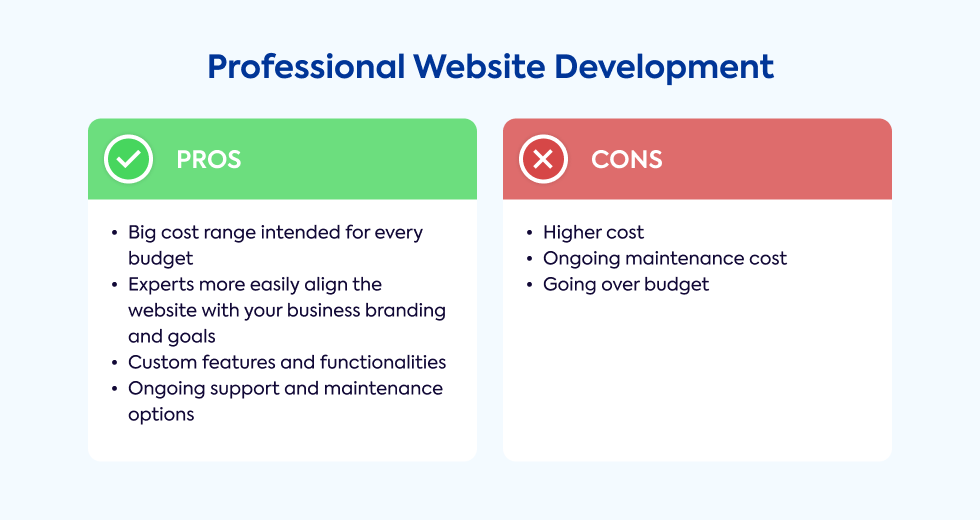
Hiring a Professional
When deciding how to build your small business website, hiring a professional is often a wise choice if your budget allows.
Professional website development costs typically range from $5,000 to $20,000 or more, depending on the level of customization and complexity you need.
By working with experienced web designers and developers, you can get a tailored design that perfectly aligns with your business branding and goals.
Professionals are particularly beneficial when you require custom features and functionality, such as e-commerce capabilities or CRM integration.
These complex elements are better handled by those with expertise, ensuring that they work seamlessly on your site.
Additionally, hiring a professional means you’ll have ongoing support and maintenance options, which are essential as your business grows and your website needs to scale.
However, there are common mistakes to avoid when hiring a website designer. Choosing inexperienced designers might lead to poor-quality websites, delays, and unexpected additional costs.
It’s important to clarify the project scope, timeline, and budget upfront to avoid misunderstandings and unanticipated expenses.
Another potential pitfall is neglecting to factor in ongoing maintenance costs and future updates when budgeting.
Over-customization can also lead to higher costs and more complex maintenance requirements, so it’s best to focus on the essential features that will benefit your business most.
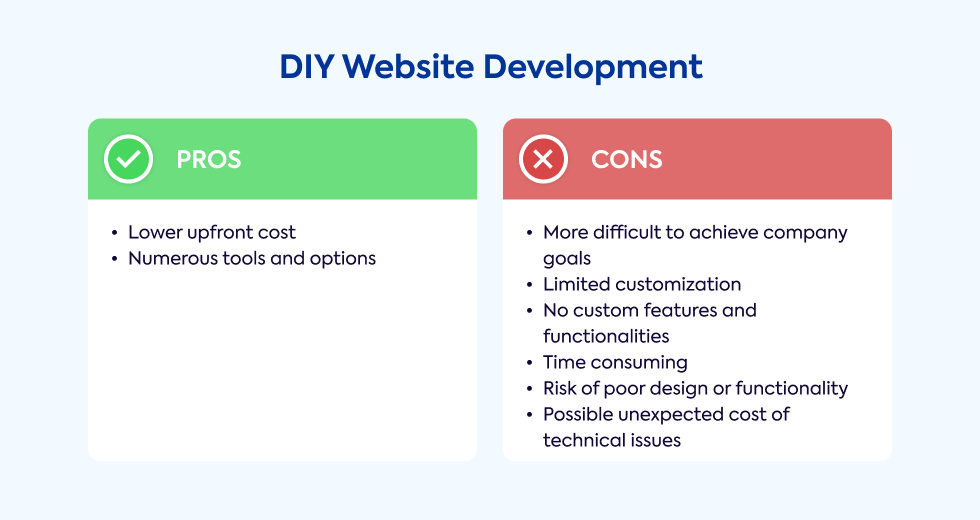
DIY Website Building
If you’re looking to save money or prefer more control over your website, DIY website building is an option worth considering.
There are numerous tools and platforms available, such as Wix, Squarespace, and WordPress, which offer user-friendly, drag-and-drop interfaces.
For those with more technical knowledge, WordPress offers extensive customization through themes and plugins, allowing you to create a website that meets your specific needs.
Platforms like Hostinger Website Builder are particularly budget-friendly, providing options like AI-driven design and e-commerce capabilities at a lower cost.
These platforms make it easy to set up a website quickly, making them ideal for businesses with straightforward needs.
However, there are pros and cons to DIY website building. On the plus side, the lower upfront costs are appealing, typically ranging from $0 to $500 annually.
You can also set up your site quickly using pre-built templates, and you’ll have full control over updates and changes without relying on external developers.
On the downside, DIY platforms often offer limited customization compared to professionally designed websites, which might result in a more generic look.
The process can also be time-consuming, especially if you lack technical knowledge—it might take 20-40 hours or more to build a decent website.
There’s also the risk of poor design or functionality, which can negatively impact user experience and your business’s credibility.
Additionally, ongoing technical issues might arise that require professional intervention, potentially adding unexpected costs.
Cost-Saving Strategies for Building Your Website
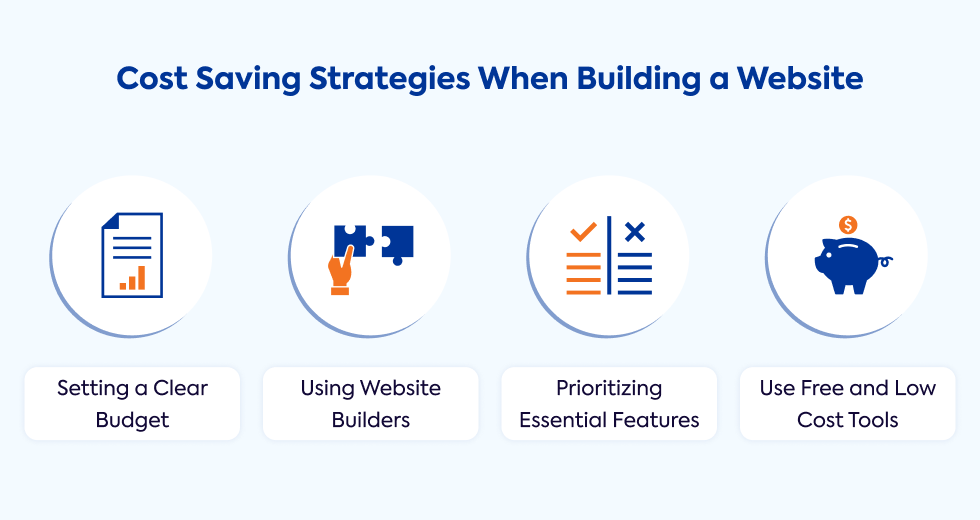
Utilizing Website Builders
For small businesses looking to minimize costs, utilizing website builders is a practical strategy.
Website builders are cost-effective, with plans typically ranging from $12 to $40 per month, making them suitable for small budgets.
These platforms are designed to be user-friendly, featuring drag-and-drop interfaces that allow you to create websites without any coding knowledge.
One of the main advantages of website builders is the quick setup. You can launch your website in just a day or two with minimal technical expertise.
Many of these platforms offer all-in-one solutions, which include hosting, templates, SSL certificates, and customer support within one package. This convenience makes website builders a popular choice for small business owners.
However, there are some limitations to consider. Website builders generally offer less flexibility in design and functionality compared to custom-built websites.
You may also become dependent on the platform you choose, making it challenging to move your website to another provider later on.
Additionally, shared hosting plans on these platforms might not handle high traffic or complex sites as effectively as dedicated hosting.
Ownership issues could also arise, as some platforms may limit your access to the source code or require ongoing subscription fees to maintain access.
Prioritizing Features Based on Budget
When building your website, it’s crucial to prioritize features based on your budget. Start by identifying which features are essential and which are non-essential.
Essential features include SSL certificates, responsive design, basic SEO, and key pages like home, about, and contact.
These elements directly impact user experience, security, and search engine rankings, making them worth the investment.
Non-essential features, such as advanced custom graphics, high-end animations, and extensive custom coding, can be added later if your budget allows.
By focusing on what’s necessary for a functional website at launch, you can control costs and still achieve a professional look.
A phased development approach is a smart way to spread out costs over time. Begin with a basic, functional website that includes the core features you need.
As your budget grows, you can gradually add additional features like e-commerce, advanced SEO, and custom design elements.
This approach not only makes the project more manageable financially but also allows you to enhance your site as your business evolves.
Budgeting Tips for Your Small Business Website
Creating a realistic budget is key to successfully building your website. Start by assessing your business needs—determine the size, functionality, and complexity of the website before setting a budget.
It’s also important to compare quotes from different designers, developers, and website builders to find the best fit for your budget.
When budgeting, don’t forget to allocate funds for ongoing costs, such as domain renewal, hosting, maintenance, and security. These are essential expenses that will recur regularly and need to be planned for.
To keep your project on track, set a clear budget limit and stick to it by prioritizing essential features. Use free or low-cost tools for basic needs and only upgrade when necessary.
Regularly reviewing and adjusting your budget as the project progresses can help you avoid overspending.
For tasks like content updates, consider DIY options to reduce the need for professional services, further keeping costs in check.
Ready to Launch Your Small Business Website? Let's Talk!
Building a website for your small business can feel overwhelming with so many factors to consider - from design and hosting to ongoing maintenance costs. But you don't have to navigate this alone.
At Gauss, we specialize in creating custom web solutions tailored to your specific needs and budget. We understand the importance of enhancing your business’s visibility, building trust, and driving sales with a well-designed website.
Let us help you turn your vision into a reality. Start a conversation with us today to explore how we can support your project and set your business up for online success.
Contact Us to get started, or learn more about our web design services. Together, we can build a website that not only meets your business goals but exceeds your expectations.
